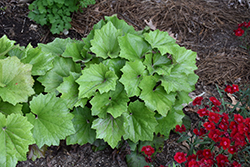It's all about ...
plants

Last Dance Rayflower
Ligularia 'Last Dance'
Plant Height: 12 inches
Flower Height: 18 inches
Spread: 24 inches
Sunlight:
![]()
![]()
Hardiness Zone: 5a
Other Names: Golden Ray
Description:
An interesting variety featuring clumps of handsome, large, leathery dark green leaves; in fall, sprays of golden-yellow, daisy-like flowers rise above to contrast the foliage; a great color and texture addition to gardens or borders
Ornamental Features
Last Dance Rayflower features showy panicles of yellow daisy flowers with gold eyes rising above the foliage from early to mid fall. Its attractive large serrated round leaves emerge lime green in spring, turning dark green in colour throughout the season.
Landscape Attributes
Last Dance Rayflower is an herbaceous perennial with an upright spreading habit of growth. Its wonderfully bold, coarse texture can be very effective in a balanced garden composition.
This is a relatively low maintenance plant, and is best cleaned up in early spring before it resumes active growth for the season. Deer don't particularly care for this plant and will usually leave it alone in favor of tastier treats. It has no significant negative characteristics.
Last Dance Rayflower is recommended for the following landscape applications;
- Mass Planting
- Border Edging
- General Garden Use
Planting & Growing
Last Dance Rayflower will grow to be about 12 inches tall at maturity extending to 18 inches tall with the flowers, with a spread of 24 inches. It grows at a medium rate, and under ideal conditions can be expected to live for approximately 20 years. As an herbaceous perennial, this plant will usually die back to the crown each winter, and will regrow from the base each spring. Be careful not to disturb the crown in late winter when it may not be readily seen!
This plant does best in partial shade to shade. It prefers to grow in average to moist conditions, and shouldn't be allowed to dry out. It is not particular as to soil pH, but grows best in rich soils. It is somewhat tolerant of urban pollution. This particular variety is an interspecific hybrid. It can be propagated by division; however, as a cultivated variety, be aware that it may be subject to certain restrictions or prohibitions on propagation.
This plant is not reliably hardy in our region, and certain restrictions may apply; contact the store for more information.
